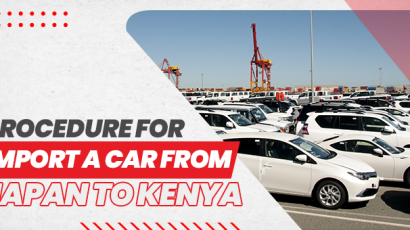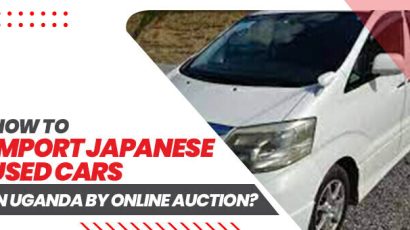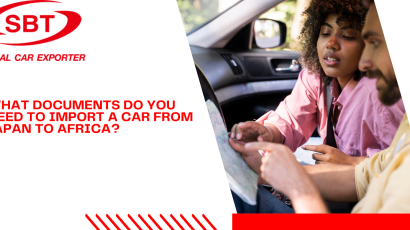
The Japanese used car market is one of the largest in the world, offering high-quality vehicles at competitive prices. Moreover, countries like Uganda, Kenya, and Nigeria frequently import these vehicles, making it essential for buyers to work with reliable exporters. However, with the rise of online fraud, verifying the authenticity of a Japanese car exporter is crucial to ensure your investment is secure. In this blog, we’ll talk about the steps to verify used car Japan exporters in Kenya, with a focus on trusted transactions in Uganda, Kenya, and Nigeria. So, let’s begin.
The Importance of Authenticity in Used Car Exports
Purchasing a used car from Japan involves significant financial investment, therefore making authenticity a non-negotiable aspect of the process. An authentic Japanese car exporter ensures:
- Transparent transactions.
- High-quality vehicles.
- Accurate documentation for import regulations.
Overall, fraudulent exporters may offer unrealistically low prices or fail to deliver the promised car, leading to financial loss and disappointment.
Key Steps to Verify a Used Car Exporter
1. Research the Exporter’s Background
Before engaging with an exporter, research their background thoroughly. Look for the following:
Company Website: A professional website with detailed information about their services and inventory is a good sign.
Physical Address: Ensure the company provides a verifiable physical address in Japan.
Years in Business: Longevity often indicates reliability and experience in the industry.
For example, when seeking an authentic Japanese car exporter in Uganda, prioritize companies with a proven track record of shipping vehicles to Africa.
2. Check for Industry Certifications
Legitimate exporters often have certifications from reputable Japanese organizations. Look for affiliations with:
Japan Used Motor Vehicle Exporters Association (JUMVEA): Membership ensures compliance with industry standards.
Chamber of Commerce: Registration here indicates that the business is legally recognized.
Auction House Memberships: Trusted exporters often work with renowned auction houses like USS or TAA.
Moreover, such certifications are particularly crucial when you need to verify used car Japan exports in Kenya to avoid scams.
3. Read Customer Reviews and Testimonials
Customer feedback provides valuable insights into the exporter’s reliability. You can:
Search Online Reviews: Platforms like Google Reviews, Trustpilot, or local forums often feature honest reviews.
Ask for References: Request contacts of previous customers in your region who can share their experiences.
For instance, feedback from Nigerian buyers can help identify trusted car dealers in Nigeria with a reputation for delivering high-quality vehicles.
4. Request Vehicle Documentation
Before purchasing, ensure the exporter provides the following essential documents:
Inspection Certificate: This confirms the vehicle’s condition and roadworthiness.
Export Certificate: A legal document proving the car is eligible for export.
Bill of Lading (BL): Issued by the shipping company, this confirms the car has been shipped.
Authentic exporters should have no issues providing these documents promptly.
5. Verify Contact Information
A legitimate company will have clear and verifiable contact details, including:
Phone Numbers: Test the number to ensure it works.
Email Address: Official business domains (e.g., @companyname.jp) are more reliable than generic ones.
Communicating via phone or video call can also help confirm the exporter’s legitimacy.
6. Be Cautious with Payment Methods
Secure payment options are a hallmark of trusted exporters. Ensure the company uses:
Bank Transfers: Payments should go to a verified business account in Japan.
Letter of Credit (LC): This adds an extra layer of security to international transactions.
Avoid exporters who insist on cash payments or personal bank transfers, as these methods are harder to trace.
Common Red Flags to Avoid
Unrealistically Low Prices
One of the most common tactics used by scammers is offering prices significantly lower than the market average. While Japanese used cars are known for being affordable, exporters who advertise prices that seem too good to be true may be trying to lure unsuspecting buyers. For instance, if a vehicle’s price is drastically lower than similar models on reputable platforms, you should investigate further. Moreover, prices should always be compared across multiple sources to identify outliers.
Lack of Online Presence
Secondly, a genuine exporter will have a professional and traceable online presence. This includes a functional website, active social media accounts, and customer reviews. However, if an exporter lacks these or their website looks outdated and unprofessional, it’s a significant red flag. Additionally, check if their domain uses secure protocols (e.g., HTTPS). Scammers often operate with minimal digital footprints to evade detection.
Pressure to Make Quick Decisions
Scammers often try to create a sense of urgency to push buyers into making quick decisions. For instance, they might claim that the vehicle you’re interested in is in high demand or that the low price is part of a limited-time offer. However, authentic exporters understand that purchasing a vehicle is a significant investment and will not rush you into making payments without sufficient information.
Unsecured or Untraceable Payment Methods
A trustworthy exporter will use secure and transparent payment methods, such as wire transfers to business accounts or letters of credit. If an exporter insists on cash payments, personal bank transfers, or cryptocurrency, it’s a major warning sign. These methods are difficult to trace and offer little to no recourse if the deal goes wrong.
Excessive Upfront Payment Demands
Lastly, while some initial payments are standard, be cautious if the exporter demands full payment upfront before providing any substantial proof of their legitimacy. A trusted exporter will often offer phased payment options or secure methods like letters of credit.
Regional Considerations for Importing Cars
Authentic Japanese Car Exporter in Uganda
Uganda has a thriving market for Japanese used cars, but buyers must navigate strict import regulations. Therefore, work with exporters experienced in Uganda’s requirements, such as pre-shipment inspection (PSI) for roadworthiness.
Verify Used Car Japan Exports in Kenya
Kenya is a significant importer of Japanese vehicles, but compliance with the Kenya Bureau of Standards (KEBS) is essential. Authentic exporters ensure your car meets these standards, making the process smoother.
Trusted Car Dealers in Nigeria
Nigeria’s demand for Japanese cars is high, but fraud is a common challenge—partner with exporters who can navigate Nigerian Customs Service (NCS) procedures and provide valid clearing documents.
Additional Tips for a Safe Purchase
Use Verified Platforms
Online platforms like Beforward, TradeCarView, or CarFromJapan specialize in connecting buyers with genuine exporters.
Engage a Local Agent
Local agents familiar with import procedures in your country can assist in verifying exporters and handling paperwork.
Visit Auctions When Possible
If feasible, attend Japanese car auctions to deal directly with auction houses, hence eliminating intermediary risks.
Conclusion
In conclusion, purchasing a used car from Japan offers numerous benefits, including affordability and quality. However, the key to a successful transaction lies in verifying the exporter’s authenticity. By researching the company’s background, checking certifications, reading reviews, and scrutinizing payment methods, you can confidently choose a reliable partner.
Whether you’re looking for an authentic Japanese car exporter in Uganda, want to verify used car Japan exports in Kenya, or need trusted car dealers in Nigeria, following these steps will ensure a secure and satisfactory purchase. Always prioritize due diligence to safeguard your investment and enjoy the benefits of owning a high-quality Japanese vehicle.











